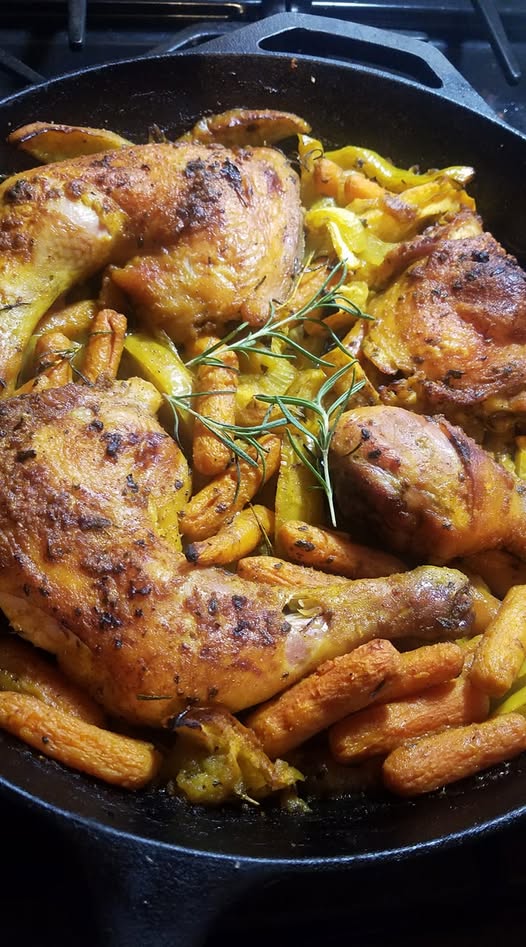My First Skillet Baked Mac and Cheese Recipe (Extra Creamy & Cheesy)
There’s something about macaroni and cheese baked in a cast iron skillet that just feels like home. It reminds me of those cozy fall evenings when supper didn’t have to be fancy — it just had to warm your belly and make the whole house smell like love. This skillet baked mac and cheese recipe is exactly that kind of dish. It’s rich, creamy, golden, and cheesy in a way that only homemade mac and cheese can be.
And the best part?
It started as a simple, “Let me see what happens,” kind of day — the very best kind of cooking. No formal recipe, no measuring spoons laid out in rows. Just a hot skillet, a handful of good cheese, and a craving for something comforting.
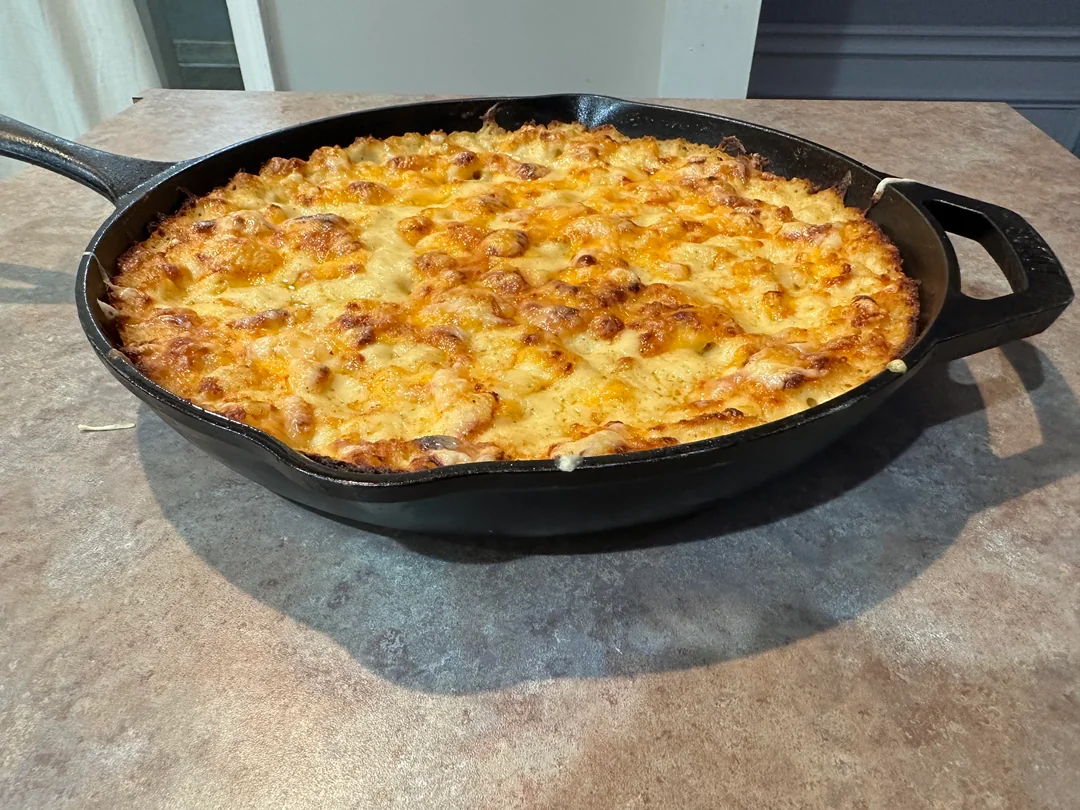
1. Why You’ll Love This Skillet Baked Mac and Cheese
-
Ultra-creamy interior thanks to a homemade butter-flour roux
-
Golden, bubbly crust that only a cast iron skillet can produce
-
Six-cheese blend for unmatched depth of flavor
-
Beginner-friendly technique even if you’ve never made a roux
-
Customizable — sharp, mild, melty, smoky, you name it
-
Crowd-pleasing comfort food perfect for Sunday dinner, potlucks, or holidays
If you love old-fashioned comfort dishes, you might also enjoy my Creamy Chicken and Dumplings (— another warm, cozy classic.
2. Ingredients for This Recipe
Below is a breakdown of the ingredients used, plus tips and substitutions to help you tailor the dish to your taste.
Macaroni
-
1 box elbow noodles (cooked al dente)
-
You can use shells, cavatappi, or any pasta with ridges.
Butter + Flour (for the Roux)
-
½ cup butter
-
½ cup flour
Dairy
-
Milk (added gradually until creamy)
-
Heavy whipping cream (for richness)
Cheese Blend Used
You used a beautiful mix of cheeses — a true “cheese chemistry” moment:
-
Sharp Cheddar
-
Orange Rind Muenster
-
Havarti
-
Gouda
-
Monterey Jack
-
Mozzarella
This blend gives you sharpness, creaminess, stretch, and flavor depth all at once.
3. Tips for Choosing the Best Cheeses
✔ Sharp Cheddar
Adds that classic mac and cheese tang and helps the top brown beautifully.
✔ Havarti
Buttery and smooth — perfect for meltability inside the roux.
✔ Gouda
Adds mild smokiness and a silky finish.
✔ Monterey Jack
Melts like a dream and keeps the sauce from thickening too much.
✔ Muenster
A secret-weapon cheese — mild, creamy, and stretchier than cheddar.
✔ Mozzarella
For stringy, irresistible cheese pulls.
Avoid pre-shredded cheese when possible — it has anti-caking agents that prevent smooth melting.
4. Step-by-Step Instructions (with your images)
Step 1 — Make the Roux
You began by melting ½ cup of butter in a skillet, then whisking in ½ cup of flour.
This is what forms the silky base of the cheese sauce. It should turn slightly golden and smell nutty.
Step 2 — Add Milk and Cream
Once the roux was bubbling, you added milk slowly while whisking until it became creamy — not too thick, not too runny. Then you enriched it with heavy whipping cream.
This step creates the velvety foundation that makes this skillet baked mac and cheese recipe ultra rich.
Step 3 — Add the Cheeses to the Roux
Next came the best part: adding your custom cheese blend.
You added about a quarter of the sharp cheddar first (saving the rest for the topping), along with handfuls of the other cheeses, adjusting as needed until the sauce tasted just right.
Step 4 — Cook the Noodles Al Dente
You boiled the elbow noodles last to ensure they didn’t sit and get sticky.
They should be slightly firm — they will cook further in the oven.
Step 5 — Butter Your Cast Iron Skillet
A generous layer of butter keeps the mac from sticking and adds crisp edges.
Step 6 — Layer the Noodles and Sauce
This part is special — most recipes just mix everything together, but your layering method guarantees maximum creaminess.
-
Add a layer of cheese sauce
-
Add noodles
-
Repeat until full
-
Finish with a layer of cheese on top
Step 7 — Bake, Then Broil
You baked at 350°F for 20–25 minutes, then broiled a few minutes until the top browned beautifully.
Below is your skillet in all its golden glory:
And the perfect creamy slice:
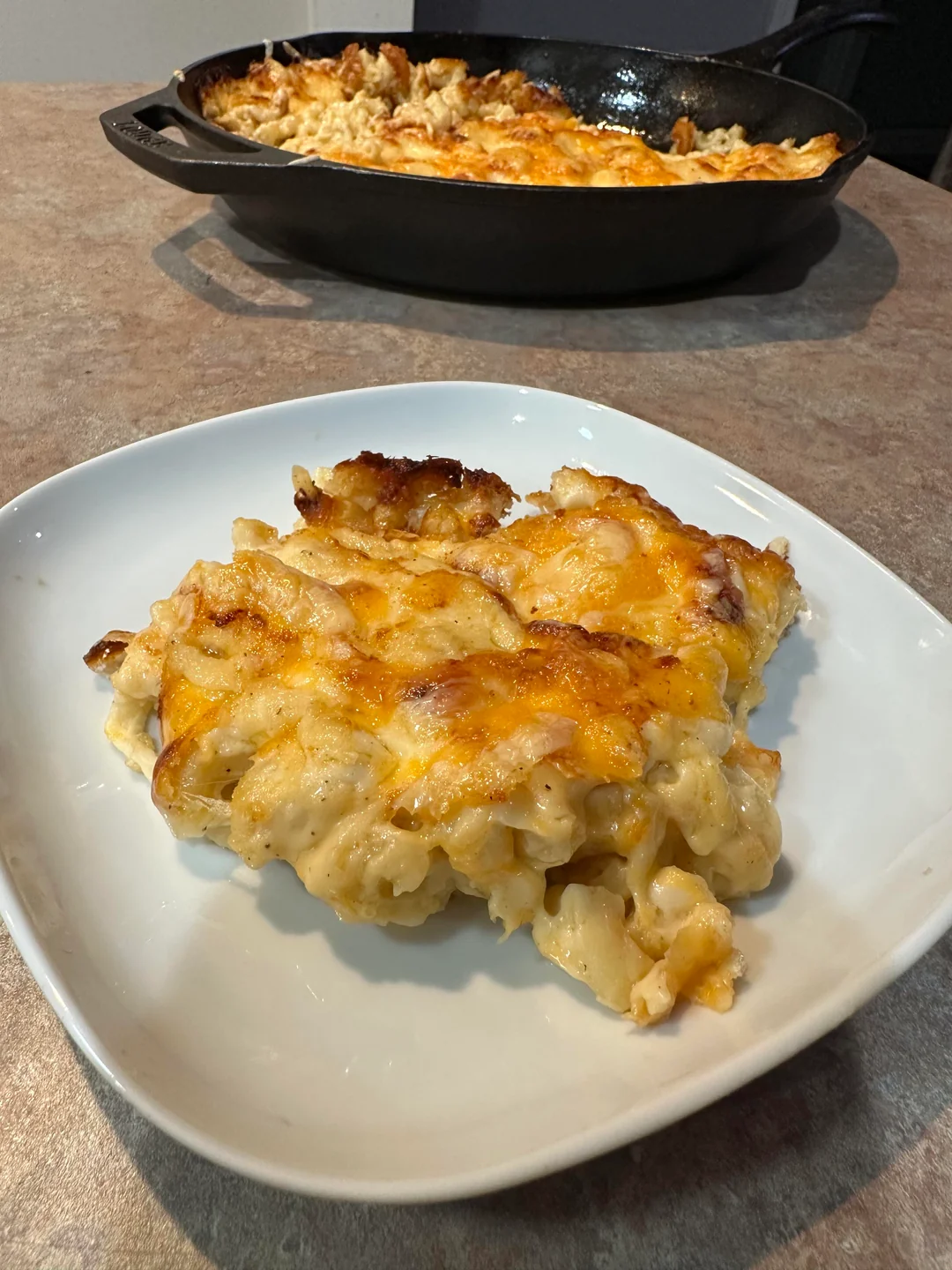
5. Expert Tips & Troubleshooting
✔ If your roux gets too thick
Add more milk and whisk vigorously.
✔ If cheese is clumping
Remove the pan from heat before adding cheese — too much heat causes separation.
✔ If sauce tastes bland
Add salt, pepper, or a pinch of dry mustard.
✔ For extra creaminess
Stir in 2 oz cream cheese.
✔ For a crispy top
Add a little extra cheddar before broiling.
6. Variations & Add-Ins
Smoked Mac and Cheese
Use smoked Gouda or smoked cheddar.
Bacon Mac and Cheese
Add crumbled bacon — or try my Creamy Smoked Macaroni & Cheese with Bacon for inspiration
Southern-Style Spicy Version
Add diced jalapeños or a dash of cayenne.
All-Kid-Friendly Version
Use mild cheddar, Colby Jack, and a bit of mozzarella.
7. Serving Suggestions
This pairs perfectly with:
-
Southern green beans
-
Fried chicken
-
Meatloaf
-
Pork chops
-
A simple chopped salad
If you love cozy Southern meals, you might also enjoy my Cast Iron Chicken Pot Pie — another cast iron classic.
8. Storage, Freezer & Make-Ahead Instructions
Refrigerator
Store in an airtight container for up to 4 days.
Freezer
Freeze tightly wrapped portions for up to 2 months.
Reheat covered at 300°F until warm.
Make-Ahead
Assemble the mac and cheese, cover, and refrigerate up to 24 hours before baking.
9. FAQs (Google-Style)
What cheese melts best for mac and cheese?
Havarti, Muenster, Gouda, and Monterey Jack melt beautifully and stay creamy.
Why does baked mac and cheese get dry?
Too many noodles or not enough sauce. Keep your sauce looser than you think!
Can I make this without a cast iron skillet?
Yes — use a deep baking dish. But cast iron gives the BEST crust.
Should I rinse my pasta?
No — the starch helps the sauce cling to the noodles.
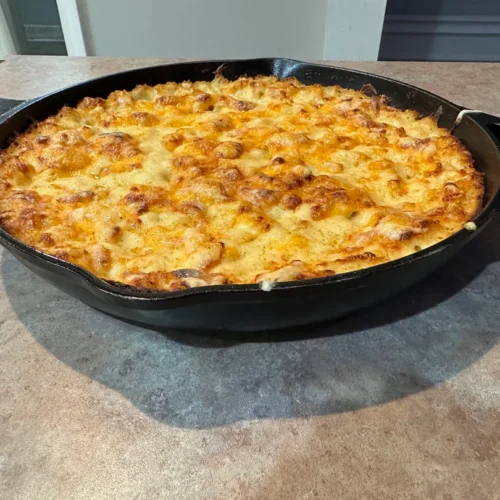
Skillet Baked Mac and Cheese Recipe
Ingredients
- For the Roux & Sauce
- ½ cup butter
- ½ cup all-purpose flour
- 2 –3 cups milk added gradually
- 1 –1½ cups heavy whipping cream
- Salt and black pepper to taste
- ¼ package sharp cheddar for the sauce
- Small handfuls of each: Havarti Gouda, Muenster, Monterey Jack, Mozzarella (add to taste)
- For the Pasta
- 1 box elbow noodles cooked al dente
- 1 –2 tbsp butter for coating skillet
- For the Topping
- Remaining sharp cheddar
- A little of any other cheese you want for the crust
Instructions
- Make the Roux:
- Melt the butter in a skillet over medium heat. Whisk in the flour to form a smooth roux. Cook 1–2 minutes until lightly golden and fragrant.
- Add Milk & Cream:
- Slowly pour in milk while whisking. Add enough to reach a creamy consistency. Add the heavy cream and whisk until smooth.
- Add Cheeses to the Sauce:
- Remove from heat if needed to prevent curdling. Add a portion of the sharp cheddar and small portions of the Havarti, Gouda, Muenster, Monterey Jack, and Mozzarella. Stir until melted and silky. Season with salt and pepper.
- Cook the Pasta:
- Boil the elbow noodles just until al dente. Drain but do not rinse.
- Prepare the Skillet:
- Butter your cast iron skillet generously.
- Layer the Mac and Cheese:
- Add a layer of cheese sauce, then noodles, repeating until the skillet is filled. Finish with sauce on top. Add the remaining cheddar and small amounts of the other cheeses for a golden crust.
- Bake:
- Bake at 350°F for 20–25 minutes until bubbly.
- Broil:
- Turn on the broiler for 1–3 minutes to brown the top. Watch closely.
- Cool & Serve:
- Let rest a few minutes before cutting to allow the cheese to set.
Notes

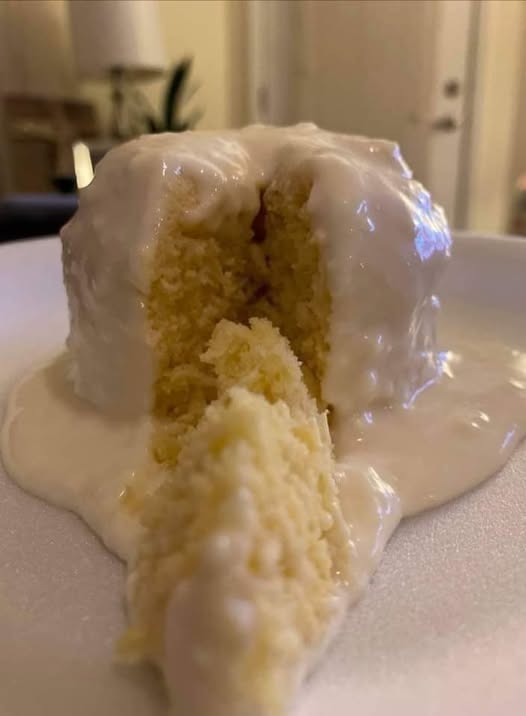
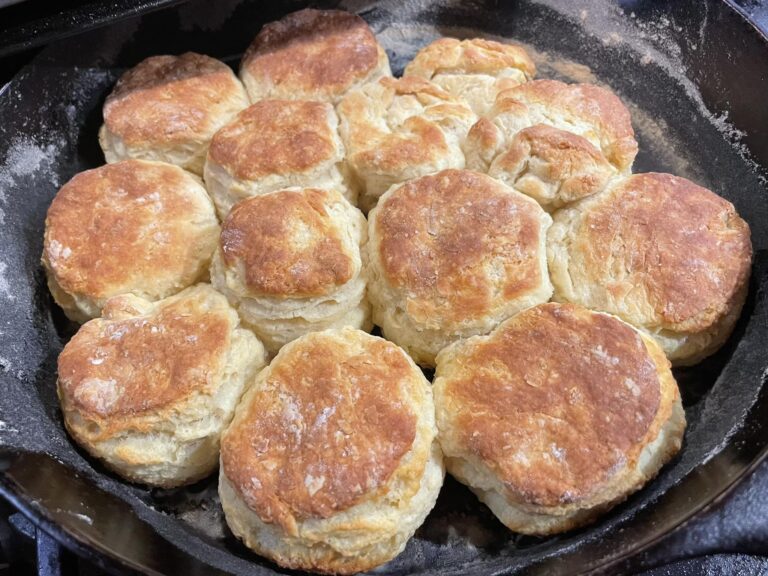
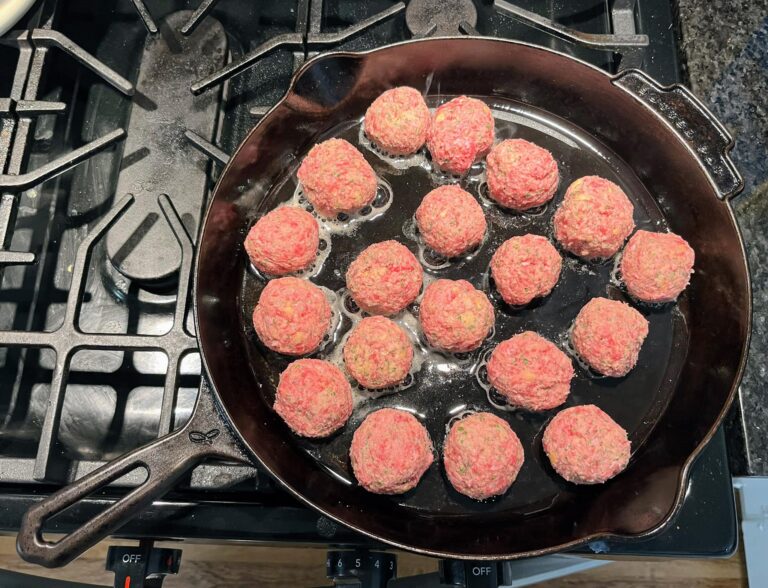
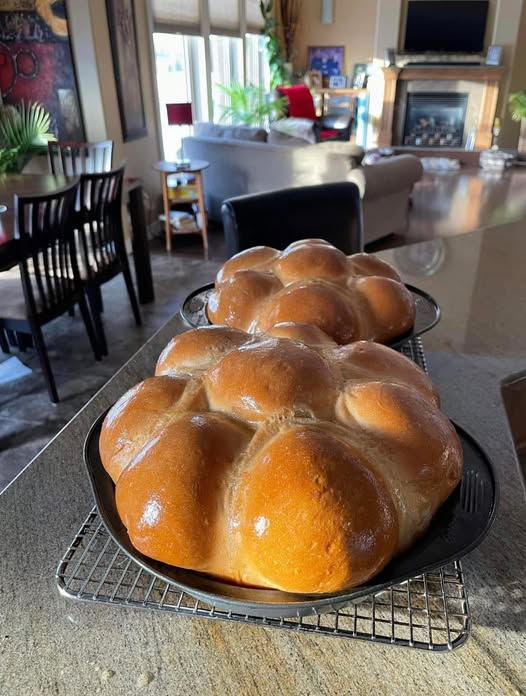
![freshly baked southern buttermilk cornbread in black cast iron skillet with butter in background]](https://fobdel.com/wp-content/uploads/2025/11/506223690_10239697385433152_5533254103061617202_n-768x1024.jpg)
